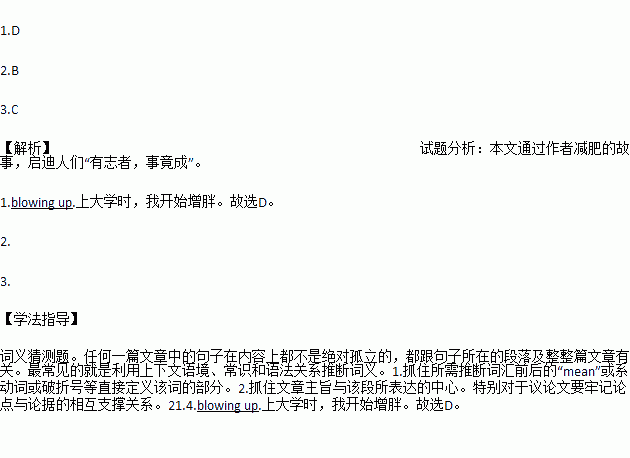题目内容
As a little child,1 was always plump(胖的).In college I started blowing up. It got out of control
when l went to law school.
I'd made a decision a thousand times: I'm going to lose weight now. But what motivated(激发)
me to get serious about it was turning 30.1 weighed 414 pounds.1 was always tired. Some of my
family members have suffered from heart disease, and l was frightened. I also wanted to look better.
So after my birthday,1 walked into the office of a weight loss doctor.
She was very understanding. Her focus was on balanced meals and she wanted me to exercise.
Walking was all I could do at first. I started by walking a few blocks and gradually increased the
distance, until one weekend, I heard myself saying, "Wow, this seems pretty easy." So I started to run.
1 was losing nine or ten pounds a month, and I had more energy. I started to think about the New
York City Marathon. For years,1 watched the runners and thought, "This looks like fun, but I could
never do that." But now I realized that maybe I could.I joined the New York Road Runners.I ran a
l0km, then a half marathon.I still wasn't confident I could run a full 26 miles. But I told myself I was
going to do it, no matter what.
By my 33rd birthday,1 was down to 180 pounds. I started formally training for the marathon.
And on the morning of November l, I stood on the Verrazano Bridge in Staten Island with more than
40,000 0ther runners, waiting for the event to start.
It was unbelievable to have the audience cheering me on, handing me cups of water. And I
crossed the finish line. My friends sprayed(向……喷射)me with beer, as if I'd won the Super Bowl.
And at that moment,I knew: If I set my mind to something, nothing is impossible.
1.The underlined phrase "blowing up" in Paragraph 1 is closest in meaning to____.
A. going weaker B. becoming fatter C. becoming healthier D. growing high
2.From the passage we can know that the author____.
A. controlled his weight at college B. began to consider losing weight at 30
C. was satisfied with his figure as a kid D. may have a family history of heart attack
3.Which of the following sayings can best summarize the passage?
A. A good beginning is half done. B. Pride comes before a fall.
C. Practice makes perfect. D. Where there is a will, there is a way.
 仁爱英语同步练习册系列答案
仁爱英语同步练习册系列答案 学习实践园地系列答案
学习实践园地系列答案
